BCAA
Filters
-
 Save 0%
Save %
Original price €39,90 - Original price €39,90Original price €39,90€39,90€39,90 - €39,90Current price €39,90| /
Save 0%
Save %
Original price €39,90 - Original price €39,90Original price €39,90€39,90€39,90 - €39,90Current price €39,90| /AllDayYouMay · 435g
5% Nutrition11 reviewsBCAAs with a 10:1:1 ratio Support for joints & liver Powerful antioxidant immune system support Muscle endurance booster Faster recovery Fast...
View full detailsOriginal price €39,90 - Original price €39,90Original price €39,90€39,90€39,90 - €39,90Current price €39,90| /Save 0% Save % -
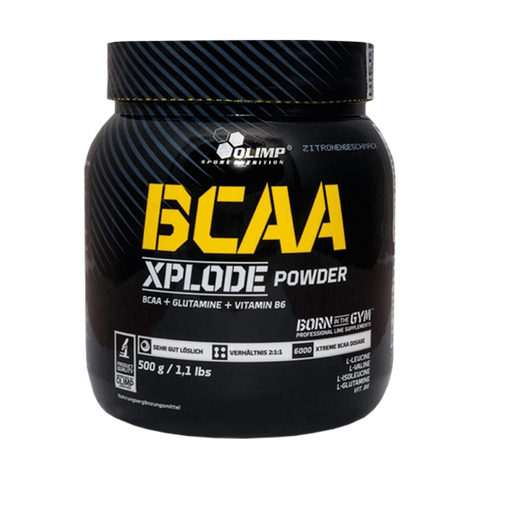 Save 0%
Save %
Original price €29,90 - Original price €29,90Original price €29,90€29,90€29,90 - €29,90Current price €29,90| /
Save 0%
Save %
Original price €29,90 - Original price €29,90Original price €29,90€29,90€29,90 - €29,90Current price €29,90| /BCAA Xplode Powder · 500g
Olimp Sport Nutrition2 reviewsBCAA Xplode supports muscle building and regeneration Contains branched-chain amino acids in a proven ratio Contains vitamin B6 for optimal use of...
View full detailsOriginal price €29,90 - Original price €29,90Original price €29,90€29,90€29,90 - €29,90Current price €29,90| /Save 0% Save % -
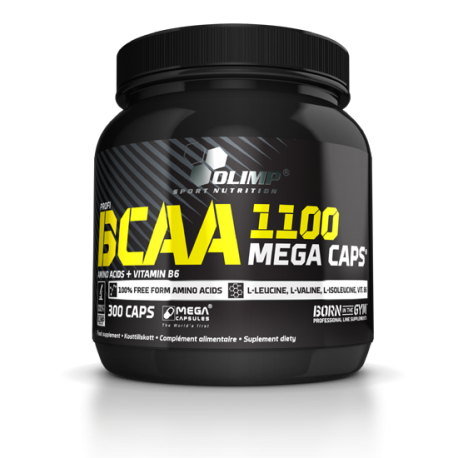 Save 11%
Save %
Original price €32,90Original price €32,90 - Original price €32,90Original price €32,90Current price €29,28€29,28 - €29,28Current price €29,28| /
Save 11%
Save %
Original price €32,90Original price €32,90 - Original price €32,90Original price €32,90Current price €29,28€29,28 - €29,28Current price €29,28| /BCAA 1100 Mega Caps · 300 capsules
Olimp Sport Nutrition1 reviewFood supplement with BCAA complex (leucine, isoleucine, valine) and vitamin B6 Improves the ability to exert oneself and increases muscle strength...
View full detailsOriginal price €32,90Original price €32,90 - Original price €32,90Original price €32,90Current price €29,28€29,28 - €29,28Current price €29,28| /Save 11% Save % -
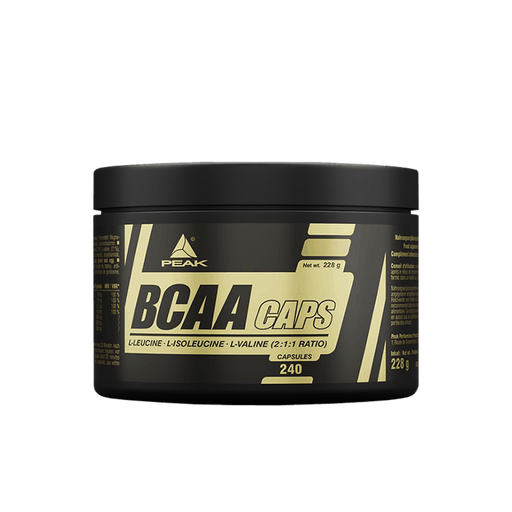 Save 11%
Save %
Original price €19,90Original price €19,90 - Original price €19,90Original price €19,90Current price €17,71€17,71 - €17,71Current price €17,71| /
Save 11%
Save %
Original price €19,90Original price €19,90 - Original price €19,90Original price €19,90Current price €17,71€17,71 - €17,71Current price €17,71| /BCAA Caps · 240 capsules
PEAKNo reviewsFree BCAA in capsule form - the No. 1 amino acid at a top price 8 g quickly absorbable BCAAs per serving Effective ratio 2:1:1 (leucine : isoleuci...
View full detailsOriginal price €19,90Original price €19,90 - Original price €19,90Original price €19,90Current price €17,71€17,71 - €17,71Current price €17,71| /Save 11% Save % -
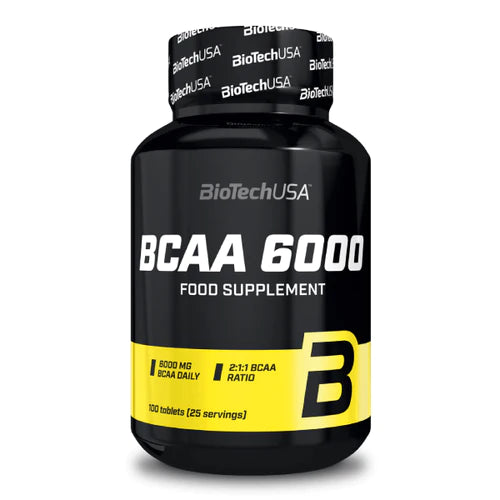 Save 11%
Save %
Original price €15,90Original price €15,90 - Original price €15,90Original price €15,90Current price €14,15€14,15 - €14,15Current price €14,15| /
Save 11%
Save %
Original price €15,90Original price €15,90 - Original price €15,90Original price €15,90Current price €14,15€14,15 - €14,15Current price €14,15| /BCAA 6000 · 100 tablets
Biotech USANo reviewsBCAA 6000 contains 6,000 mg BCAAs in a 2:1:1 ratio for effective muscle mass. The convenient tablet form makes it easy to take anywhere. BioTech U...
View full detailsOriginal price €15,90Original price €15,90 - Original price €15,90Original price €15,90Current price €14,15€14,15 - €14,15Current price €14,15| /Save 11% Save % -
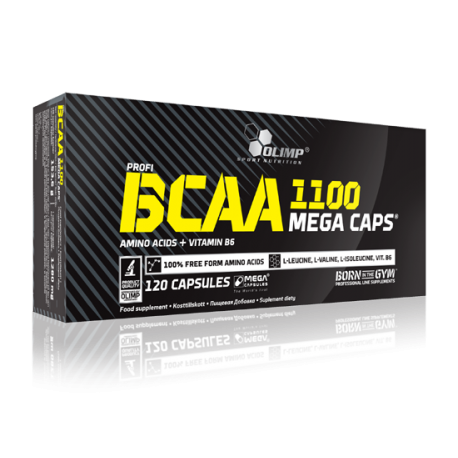 Save 11%
Save %
Original price €16,90Original price €16,90 - Original price €16,90Original price €16,90Current price €15,04€15,04 - €15,04Current price €15,04| /
Save 11%
Save %
Original price €16,90Original price €16,90 - Original price €16,90Original price €16,90Current price €15,04€15,04 - €15,04Current price €15,04| /BCAA 1100 Mega · 120 capsules
Olimp Sport Nutrition2 reviewsBCAA 1100 Mega Caps increase stamina during training They support the build-up of muscle mass and strength Contains branched-chain amino acids in ...
View full detailsOriginal price €16,90Original price €16,90 - Original price €16,90Original price €16,90Current price €15,04€15,04 - €15,04Current price €15,04| /Save 11% Save % -
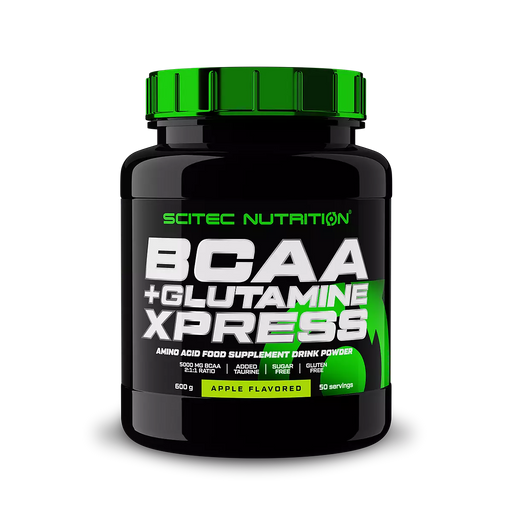 Save 0%
Save %
Original price €29,90 - Original price €29,90Original price €29,90€29,90€29,90 - €29,90Current price €29,90| /
Save 0%
Save %
Original price €29,90 - Original price €29,90Original price €29,90€29,90€29,90 - €29,90Current price €29,90| /BCAA + Glutamine Xpress · 600g
SCITEC NutritionNo reviewsEssential amino acidsProvides 5 grams of BCAA in a 2:1:1 ratio and 5 grams of glutamine per serving. Muscle maintenance: Supports muscle amino ...
View full detailsOriginal price €29,90 - Original price €29,90Original price €29,90€29,90€29,90 - €29,90Current price €29,90| /Save 0% Save % -
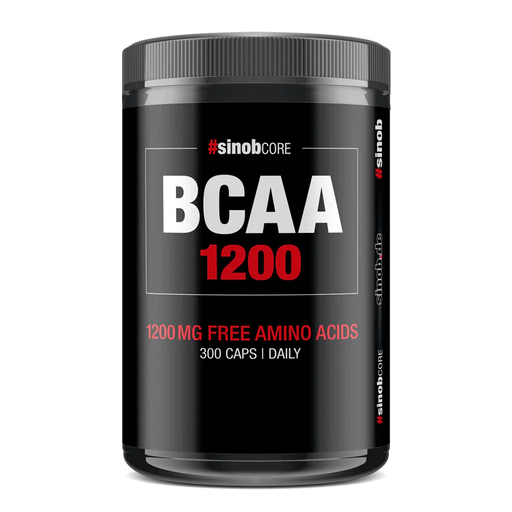 Save 11%
Save %
Original price €29,90Original price €29,90 - Original price €29,90Original price €29,90Current price €26,61€26,61 - €26,61Current price €26,61| /
Save 11%
Save %
Original price €29,90Original price €29,90 - Original price €29,90Original price €29,90Current price €26,61€26,61 - €26,61Current price €26,61| /Core BCAA 1200mg · 300 capsules
#sinobNo reviewsEssential amino acids: BCAAs (isoleucine, leucine, valine) are essential for the body and must be taken in through food or supplements. Muscle ...
View full detailsOriginal price €29,90Original price €29,90 - Original price €29,90Original price €29,90Current price €26,61€26,61 - €26,61Current price €26,61| /Save 11% Save % -
 Save 0%
Save %
Original price €26,90 - Original price €26,90Original price €26,90€26,90€26,90 - €26,90Current price €26,90| /
Save 0%
Save %
Original price €26,90 - Original price €26,90Original price €26,90€26,90€26,90 - €26,90Current price €26,90| /HIT BCAA 10:1:1 · 400g
DY NutritionNo reviews12g BCAAs per servingHIT BCAA 10:1:1 maximizes training efficiency and supports intensive muscle growth. Enhanced formula: Enriched with citrul...
View full detailsOriginal price €26,90 - Original price €26,90Original price €26,90€26,90€26,90 - €26,90Current price €26,90| /Save 0% Save % -
 Save 0%
Save %
Original price €24,90 - Original price €24,90Original price €24,90€24,90€24,90 - €24,90Current price €24,90| /
Save 0%
Save %
Original price €24,90 - Original price €24,90Original price €24,90€24,90€24,90 - €24,90Current price €24,90| /Breach BCAA · 345g
REDCON13 reviewsBCAAs are essential amino acids that are crucial for muscle building. The body cannot produce BCAAs itself and they must be obtained through diet ...
View full detailsOriginal price €24,90 - Original price €24,90Original price €24,90€24,90€24,90 - €24,90Current price €24,90| /Save 0% Save % -
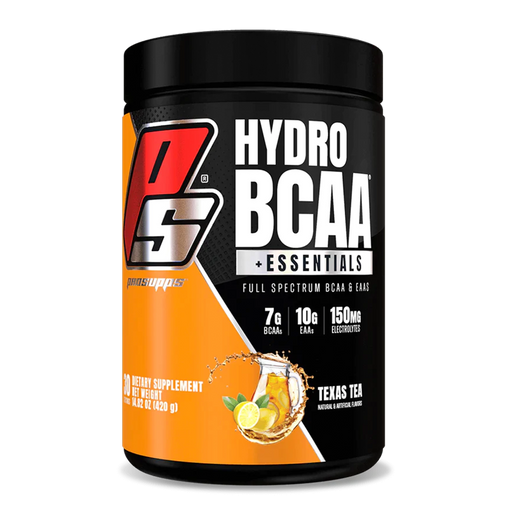 Save 0%
Save %
Original price €29,90 - Original price €29,90Original price €29,90€29,90€29,90 - €29,90Current price €29,90| /
Save 0%
Save %
Original price €29,90 - Original price €29,90Original price €29,90€29,90€29,90 - €29,90Current price €29,90| /Hydro BCAA · 420g
ProsuppsNo reviewsHydroBCAA® is a vegan amino acid supplement for performance enhancement, recovery and hydration. Contains a complete 10g EAA matrix to optimize mu...
View full detailsOriginal price €29,90 - Original price €29,90Original price €29,90€29,90€29,90 - €29,90Current price €29,90| /Save 0% Save % -
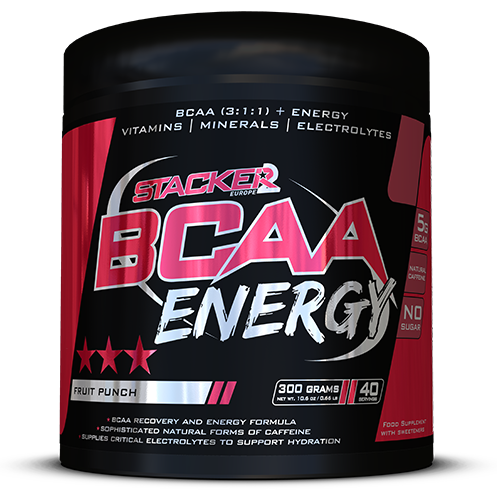 Save 0%
Save %
Original price €24,90 - Original price €24,90Original price €24,90€24,90€24,90 - €24,90Current price €24,90| /
Save 0%
Save %
Original price €24,90 - Original price €24,90Original price €24,90€24,90€24,90 - €24,90Current price €24,90| /BCAA Energy · 300g
Stacker 22 reviewsHigh quality electrolyte and synergy ingredients: Provides improved hydration and supports athletic performance. Natural caffeine sources: 80 m...
View full detailsOriginal price €24,90 - Original price €24,90Original price €24,90€24,90€24,90 - €24,90Current price €24,90| /Save 0% Save %
What are BCAAs?
The term BCAAs is another name for the group of branched-chain amino acids, which includes the three amino acids leucine, isoleucine and valine. The name "branched-chain amino acids" is derived from the special molecular structure of these amino acids. BCAAs belong to the category of essential amino acids that the body cannot produce itself from other amino acids, which means that the branched-chain amino acids must be supplied through food or in the form of supplements. BCAAs are found in the highest concentration in muscle tissue and make up over 30% of muscle protein. In contrast to all other amino acids, branched-chain amino acids are not metabolized in the liver but directly in muscle tissue and can therefore contribute to covering the energy requirements of the muscles during intensive muscular exertion. This is why it often makes sense for athletes in particular to buy BCAA supplements.
Why are BCAAs supplemented?
During intensive training sessions, in addition to carbohydrates, branched-chain amino acids from the amino acid pool of the muscles are also used to supply the muscles with energy. Supplementation with BCAAs after training can promote regeneration and prevent catabolic muscle breakdown for the purpose of replenishing the muscles' BCAA stores. As an added bonus, BCAAs can reduce post-workout muscle soreness.
Furthermore, BCAAs, and in particular the branched-chain amino acid leucine, stimulate protein synthesis after training, creating an anabolic environment that promotes muscle mass gain. BCAAs supplemented before and during training can also increase training performance, as they are available to the hard-working muscles as an additional source of energy and can delay the onset of exhaustion. As part of a calorie-restricted diet, BCAAs are often used to prevent a diet-induced catabolic environment in the body and the associated loss of muscle mass. As an added bonus, BCAAs can stabilize blood sugar levels during a diet and reduce hunger and appetite.
What are the main benefits of BCAAs?
- Support and promote muscle recovery after training
- Stimulate protein synthesis and promote muscle building
- Increase aerobic and anaerobic training performance
- Delaying the onset of muscle fatigue
- Anti-catabolic effect and prevention of muscle breakdown during a calorie-restricted diet
- Reduction of muscle soreness after training
- Reduction of hunger and appetite during a calorie-restricted diet
Do BCAAs have side effects?
No harmful side effects are known. BCAAs are found in protein-rich foods and are completely natural as the main component of our muscles. Of course, excessive consumption should be avoided.
Dosages of BCAA supplements
There are different dosages of Branched-Chain-Amino-Acids. The ratio of the individual amino acids is always stated in the supplements. The dosage always refers to the ratio of BCAAs to each other and is always given according to the following scheme:
Leucine : Isoleucine : Valine
Most BCAA supplements are dosed as follows:
- 2:1:1
- 4:1:1
- 8:1:1
The relatively high proportion of leucine can be explained by the fact that leucine has a significant influence on protein synthesis compared to the other two amino acids and is therefore particularly important for muscle building.
Isoleucine Leucine Valine
The amino acids isoleucine, leucine and valine are essential for the body and have a typical branching in their structural chains. They are therefore referred to as branched-chain amino acids. All three belong to the neutral amino acids, they can behave both alkaline and acidic.
Isoleucine, leucine and valine are an important source of energy for the muscles. They reduce the breakdown of proteins and promote the synthesis and storage of proteins during increased physical stress. Because of this effect, they are known as stress amino acids. Isoleucine, leucine and valine are not metabolized in the liver like other amino acids. They enter the muscles directly and are used there by the muscle cells as an important source of energy. They also appear to protect muscle glycogen stores. The body breaks down proteins to a greater extent during increased physical stress, for example during injuries, illnesses and operations. Isoleucine, leucine and valine help to reduce this breakdown. They also make it easier to synthesize and store proteins in the body. The branched-chain amino acids are also transported to the brain, where they compete with the amino acids tyrosine and tryptophan for absorption. Leucine also stimulates the release of insulin in the pancreas. This in turn promotes protein synthesis and hinders the breakdown of proteins. Valine is a glycogen-active amino acid. It plays a role in the biosynthesis of pantothenic acid and penicillin and is important for nerve and muscle function.
The best food sources of BCAAs
Fortunately, there is a wide range of foods that contain BCAAs. Some foods with the highest BCAA content include:
- Meat, poultry, fish: 3 to 4.5 grams per 3 oz (84 grams)
- Beans and lentils: 2.5 to 3 grams per cup
- Milk: 2 grams per cup (237 ml)
- Tofu and tempeh: 0.9 to 2.3 grams per 3 oz (84 grams)
- Cheese: 1.4 grams per 1 oz (28 grams)
- Eggs: 1.3 grams per large egg
- Pumpkin seeds: About 1 gram per 1 oz (28 grams)
- Quinoa: 1 gram per cup
- Nuts: 0.7 to 1 gram per 1 oz (28 grams)
How do BCAAs work?
BCAAs make up a large portion of the amino acids in the body's amino acid pool. Together, the three BCAAs represent about 35 to 40% of all essential amino acids in the body and 14 to 18% of the essential amino acids found in muscle (2).
Unlike most other amino acids, BCAAs are mainly broken down in the muscles rather than in the liver. For this reason, they play a role in energy production during exercise (12).
However, BCAAs play numerous other roles in the body. For example, the body can use them as building blocks for proteins and muscles (13, 14, 15).
They are also involved in regulating blood sugar levels by maintaining glycogen stores in the liver and kidneys and stimulating cells to use sugar from the bloodstream (16, 17, 18, 19).
In addition, BCAAs can help reduce the fatigue felt during exercise by reducing the production of serotonin in the brain (20). Of the three BCAAs, leucine has the greatest impact on the body's capacity to build muscle proteins (13). Isoleucine and valine, on the other hand, appear to be more effective when it comes to energy production and regulating blood sugar levels (16, 21).
Health benefits and benefits for athletic performance:
BCAAs can reduce fatigue during exercise
Consuming BCAAs may help reduce physical and mental fatigue. Studies with human subjects reported up to 15% less fatigue in subjects who received BCAAs during exercise compared to subjects who only received a placebo (4, 5).
In one study, this increased resistance to fatigue helped the BCAA group to exercise 17% longer before reaching a state of exhaustion compared to the placebo group (6).
In another study, subjects were exposed to heat stress during a cycling test. They were asked to take either a BCAA drink or a placebo drink. The subjects who drank the BCAA drink were able to last 12% longer than the members of the placebo group (7).
However, not all studies were able to show that reduced fatigue led to improvements in physical performance (4, 5, 8, 9, 10). In addition, BCAAs may be more effective in reducing exercise fatigue in untrained individuals than in trained individuals (11).
Summary: In some people, BCAAs may help reduce exercise fatigue. Whether this can improve exercise performance is still a matter of debate.
BCAA supplements can reduce muscle soreness
BCAAs may also help reduce post-workout muscle soreness. One way they could do this is by reducing blood levels of the enzymes creatine kinase and lactate dehydrogenase, which are involved in muscle damage. This could improve recovery and provide some protection against muscle damage (22).
In various studies, subjects were asked to rate their muscle soreness after performing certain strength training exercises. Subjects who had used BCAA supplements rated their muscle soreness as 33% less severe than those who had only received a placebo (23, 24, 25).
In some cases, those who received BCAAs performed up to 20% better when they repeated the same strength training test 24 to 48 hours later (24, 26). However, the effects may vary based on gender and total protein content of the diet (23, 27).
Summary: BCAAs taken before or after strength training may reduce post-workout muscle soreness, although these effects may vary from person to person.
BCAAs may increase muscle mass
Many people who buy BCAA supplements do so to increase their muscle mass. In fact, scientific research shows that BCAAs activate enzymes that are responsible for building muscle (15).
Some studies also show that BCAA supplements may be effective in increasing muscle mass, especially if they contain a higher proportion of leucine than isoleucine and valine (28, 29).
However, there is currently no evidence that taking BCAAs through a supplement is better than taking them through food or a less expensive whey protein or soy protein supplement. Some studies even show that consuming supplements containing complete protein is better for muscle growth than taking a supplement containing isolated amino acids, at least in some cases (30).
Summary: A sufficiently high intake of BCAAs is likely to increase muscle growth. This intake can be in the form of protein-rich foods or in the form of supplements.
BCAAs could lower blood sugar levels
BCAAs may also help to maintain normal blood sugar levels. It is believed that leucine and isoleucine may increase insulin secretion and cause muscles to absorb more sugar from the blood, leading to a reduction in blood glucose levels (16, 31, 32).
In practice, however, not all studies support this (33, 34, 35). Some studies even report a potential increase in blood glucose levels depending on the type of diet followed. For example, when BCAAs are combined with a high-fat diet, consumption of these amino acids in supplement form can lead to insulin resistance (36, 37). However, many of the studies on this topic were conducted with animals or isolated cells, which means that their results are not necessarily directly transferable to humans. Even in humans, the results can vary from person to person.
In a recent study, for example, subjects were given 12.5 grams of BCAAs three times a day. In 10 subjects, this led to a reduction in blood glucose levels, while no effects were observed in 17 subjects (38). For these reasons, further studies are needed before reliable conclusions can be drawn.
Summary: BCAAs may help to promote glycemic control, at least in some cases. However, further studies are needed to confirm these effects.
BCAAs could accelerate weight loss
Branched-chain amino acids may help prevent weight gain and accelerate fat loss.
In fact, observational studies report that people who consume an average of 15 grams of BCAAs per day as part of their normal diet have a 30% lower risk of becoming overweight or obese than those who consume an average of 12 grams of BCAAs per day (39, 40).
However, it is worth noting that those who consumed fewer BCAAs also consumed about 20 grams less protein per day, which may have influenced the results. If you're trying to lose weight, BCAAs may help your body shed unwanted fat more effectively.
Competition-level wrestlers who followed a high-protein, calorie-restricted diet and supplemented with BCAAs lost 1.6 kilograms more weight over the course of 19 days than the study participants who received a soy protein supplement instead of BCAAs (41). The BCAA group also lost 0.6% more body fat than the soy protein group, despite consuming the same amount of calories and slightly less protein per day.
In another study, weightlifters who received 14 grams of BCAAs per day lost 1% more body fat over the course of 8 weeks than subjects who received 28 grams of whey protein per day instead. The BCAA group also gained 2 kilos more muscle (42). However, these two studies have some limitations. For example, they provide little information about the composition of the supplement and the diet followed, which could have influenced the results.
In addition, studies that have examined the effects of BCAAs on weight loss provide inconsistent results (43).
Summary: BCAAs may prevent weight gain and accelerate weight loss. However, more studies are needed to determine whether these supplements provide any benefits beyond those of a high-protein diet.
BCAAs can prevent muscle loss
BCAAs can help prevent muscle breakdown and muscle loss. Muscle proteins are continuously broken down and rebuilt. The ratio of muscle protein breakdown to muscle protein build-up determines the amount of protein in the muscle (44). A loss of muscle mass occurs when protein breakdown exceeds protein synthesis. Muscle breakdown is often a sign of malnutrition and occurs in chronic infections, cancer, periods of fasting and as a natural part of the aging process (45). In humans, BCAAs make up 35% of the essential amino acids in muscle protein. They also make up 40% of the total amino acids needed by the body (46). For this reason, it is important that BCAAs and other essential amino acids are replaced during periods of muscle breakdown to halt or slow this process.
Several studies support the use of BCAAs to inhibit muscle protein breakdown. This could improve health and quality of life in certain populations such as the elderly or people suffering from diseases such as cancer that lead to muscle breakdown (47, 48, 49).
Summary: Taking BCAA supplements may prevent the breakdown of protein in certain populations suffering from muscle wasting.
BCAAs may reduce complications of liver disease
BCAAs may help reduce complications associated with liver failure. One possible complication is hepatic encephalopathy (HE), which can lead to confusion, unconsciousness and coma.
A recent study review suggests that BCAA supplements may be more useful than other supplements in reducing the severity of HE in patients with liver disease (41). However, BCAAs did not improve overall survival or reduce the risk of other complications such as infection and gastric bleeding.
Another study review involving subjects who had undergone liver surgery reported that BCAA-fortified solutions could help improve liver function, reduce the risk of complications and reduce the length of hospital stay (42).
BCAA supplements may also be effective in reducing fatigue, alleviating weakness, improving sleep quality and reducing muscle cramps in people with liver disease (43).
In the case of liver cancer, taking BCAA supplements could help reduce water retention and reduce the risk of premature death by up to 7% (44).
Summary: BCAA supplements may be effective in improving liver function and reducing complications in people with liver disease.
BCAAs could alleviate sleep disorders
In a clinical study of 5 healthy men, nocturnal BCAA infusions improved respiratory control and could potentially help reduce sleep apnea (54).
In a study of 7 patients with renal failure, taking a BCAA supplement in the evening increased REM sleep time and reduced end-expiratory CO2 levels, which are important for dreaming and respiratory function during sleep (55).
Typical groups for an additional requirement of isoleucine, leucine and valine
The requirement for the branched-chain amino acids isoleucine, leucine and valine is particularly increased during physical stress and intensive sports training. The daily intake from the diet may then not be sufficient to cover the necessary requirement.
- People with high physical stress
- Athletes with intensive training
- Diseases that are associated with low levels of branched-chain amino acids
When isoleucine, leucine and valine are lacking in the body
The need for the branched-chain amino acids isoleucine, leucine and valine can increase under severe physical stress, possibly also during high sporting performance. They are then broken down more quickly, which also depletes the protein reserves in the muscles. Leucine in particular can oxidize during very intensive training and is therefore no longer available for protein synthesis. These amino acids can be reduced if nerve muscle function is impaired and must then be supplemented. In schizophrenia, they lower the blood levels of the amino acids phenylalanine and tyrosine, which are required for the formation of the neurotransmitter dopamine.
Maple syrup disease is a very rare metabolic disorder in which the breakdown of isoleucine, leucine and valine is impaired. This disease is therefore also known as valine-leucine-isoleucinuria. A typical symptom is the smell of caramel or maple syrup in the urine. It is caused by the decomposition of the amino acids isoleucine, leucine and valine, which are increasingly present in the blood. This disease is already apparent in infancy and leads to brain damage. It is treated with a lifelong diet in which the intake of isoleucine, leucine and valine is reduced.
Use in sport
In order to stay in optimal shape, athletes who train regularly are forced to get enough protein every day. As variation is the key to a balanced, high-quality diet, they are faced with the problem of having to choose protein sources that contain relatively high levels of fat on the one hand, and on the other hand they must always achieve a protein surplus (even if not excessive) in order to compensate for amino acid balances and digestive losses.
Branched chain amino acids (BCAAs), so called because of their specific molecular structure, may be the solution. They offer the athlete the following advantages:
- They are extremely important for the regeneration and maintenance of muscle tissue,
- have a strong anabolic (anabolic) effect,
- have a positive influence on the energy balance
- improve endurance, and
- act as nitrogen donors (nitrogen suppliers) for the build-up of non-essential amino acids (alanine/glucose cycle).
When you eat a protein-rich meal, the branched-chain amino acids are the first to be absorbed. After processing in the liver, almost 70 % of all amino acids entering the blood are BCAAs. They are then absorbed very quickly by the muscles. In the first three hours after a meal, branched-chain amino acids account for around 50-90% of the total amino acid intake of the muscles. In addition, BCAAs, especially leucine, stimulate the production of insulin. Together with BCAAs, insulin supports the uptake of all other amino acids (except tryptophan) by the muscle cells. In order to make optimum use of the branched-chain amino acids, they must all be taken together (taking leucine alone has a negative effect on protein utilization in the body). The rapid absorption of BCAAs prevents the absorption of two other important amino acids of the same group, tryptophan and tyrosine. As single, free amino acids, they should not be taken together with BCAA supplements, but preferably three hours apart.
Three substances are particularly important for the metabolism of BCAAs: biotin, pantothenic acid and vitamin B 6. If you are taking a preparation with branched-chain amino acids, you should ensure that you have a sufficient supply of these nutrients.
The isolated intake of BCAAs, i.e. the sole intake of all three branched-chain amino acids before strength or endurance training, can no longer be justified according to the latest findings. The intake before training results in a considerable urea load when generating energy from BCAAs. Approx. 0.5g of urea is produced from 1g of BCAAs, which puts a strain on the body. For this reason, it is not advisable to take BCAAs before endurance training in particular, but even forced strength training is likely to cause the body to use previously taken isoleucine or valine primarily for energy production.
The isolated intake of leucine, isoleucine and valine can temporarily disrupt protein synthesis for muscle building. BCAA supplements should therefore be taken in combination with other proteins, preferably with proteins that only contain small amounts of branched-chain amino acids.
One advantage of BCAA intake for athletes is the ammonia-reducing effect that these amino acids have on the body. While arginine and ornithine support the liver in breaking down the metabolic "slowing agent" ammonia, leucine and isoleucine can perform the same task in the muscles. As BCAAs are preferentially transported in the blood, they inhibit the supply of other amino acids of the same group, such as tryptophan, phenylalanine and tyrosine, to the brain. So if you value a high serotonin output (and thus a higher HGH output), you should not take BCAAs in addition to dietary protein if possible. The branched-chain amino acid L-leucine plays a particularly important role in energy metabolism. Particularly in times of reduced carbohydrate intake (slimming diets, competition preparation), leucine can reduce the effects of a reduced energy supply from glucose from carbohydrates - (blood) plasma glucose to maintain blood sugar levels - by inhibiting the breakdown of glucose in the muscles and brain. Valine and isoleucine are mainly used for gluconeogenesis (the formation of new glucose) in the event of carbohydrate deficiency. However, the effect of leucine as a regulator in glucose deficiency should not be overestimated and does not justify an increased leucine intake on its own.
More important in this context is the disproportionately high breakdown of leucine in the muscles during physical exertion compared to other amino acids. The loss of leucine is quickly compensated for by the body's own reserves (amino acid pool, muscle protein). This circumstance would justify a disproportionate intake of leucine in athletes. However, it is not advisable to take leucine in isolation. It is better to take high-quality protein with a high leucine content or to combine BCAAs with other proteins.
Dosage
The amount of BCAAs you should supplement depends on your individual needs and goals.
A World Health Organization (WHO) report from 1985 states that the average adult should consume a minimum of 34 mg of BCAAs per kilogram of body weight per day (1).
However, more recent research suggests that the daily requirement could be as high as 155 mg per kilogram of body weight per day (2, 3).
Based on recent studies, adults should aim for the following amounts of BCAAs per day:
- Women: At least 9 grams of BCAAs per day.
- Men: At least 12 grams of BCAAs per day.
People who consume adequate amounts of protein-rich foods generally do not need additional BCAA supplements. However, the daily requirement may be higher for athletes and people who train with weights. In these cases, supplementation may be beneficial.
Most studies that observed benefits in trained subjects used supplementation in the range of 10 to 20 grams of BCAAs per day. The best time to take BCAA supplements is before and/or after training. Many people who are trying to build muscle also take BCAAs in the morning and before bedtime. However, whether the exact time of intake makes a big difference has not yet been sufficiently investigated.
Is it possible to overdose on isoleucine, leucine and valine or are there side effects?
There are practically no known side effects from supplementing with isoleucine, leucine and valine. At high intakes, they are converted into other amino acids, used as energy or converted into storage fat. However, people with liver and kidney disease should not take these amino acids without therapeutic advice.
High doses of these amino acids can also hinder the transport of the amino acid tryptophan, a precursor of serotonin, into the brain.
Precautions and warnings
Pregnancy and lactation: Not enough is known about the safety of BCAAs during pregnancy and lactation. For this reason, pregnant and breastfeeding women should avoid BCAAs to be on the safe side.
Amyotrophic lateral sclerosis (ALS): The use of branched-chain amino acids has been associated with lung failure and higher death rates when used by ALS patients. For this reason, if you have ALS, you should not use BCAAs until more is known.
Ketoaciduria: In people who suffer from ketoaciduria (maple syrup disease), increased intake of branched-chain amino acids can lead to seizures and serious physical and mental disorders. For this reason, BCAAs should be avoided if you suffer from this disease.
Chronic alcoholism: Use of branched-chain amino acids by alcoholics has been associated with liver damage leading to brain damage (hepatic encephalopathy). Low blood sugar levels in young children: There are reports that taking the branched-chain amino acid leucine can lower blood sugar in young children suffering from idiopathic hypoglycemia. However, the cause of this is unknown. Some scientists suspect that leucine stimulates the pancreas to release insulin, which lowers blood sugar levels.
Operations: Leucine could affect blood sugar levels and there are therefore concerns that BCAAs could interfere with blood sugar control during and after surgery. For this reason, it is advisable to stop taking BCAAs two weeks before an operation.
Interactions
Care should be taken when combining BCAAs with the following medications
Levodopa
Branched-chain amino acids may reduce the amount of levodopa absorbed by the body. By reducing the amount of levodopa absorbed by the body, BCAAs may reduce the effectiveness of levodopa. For this reason, branched-chain amino acids and levodopa should not be taken at the same time.
Diabetes medication
BCAAs could lower blood sugar. Diabetes medications are also used to lower blood sugar levels. Taking branched-chain amino acids in combination with diabetes medication could result in an excessive drop in blood sugar levels. For this reason, blood glucose levels should be carefully monitored. It is possible that the dosage of diabetes medication may need to be adjusted.
Care should be taken when combining BCAAs with the following medications
Diazoxide
Branched-chain amino acids are used by the body to produce proteins. Taking diazoxide in combination with BCAAs could reduce the use of branched-chain amino acids for protein production. However, more information is needed on this interaction.
Anti-inflammatory drugs (corticosteroids)
Branched-chain amino acids are used by the body to make proteins. Taking glucocorticoids in combination with BCAAs could reduce the use of branched-chain amino acids for protein production. However, more information is needed on this interaction.
Thyroid hormones
Branched-chain amino acids are used by the body to make proteins. Some thyroid hormones can slow down the breakdown of BCAAs by the body. However, more information is needed to determine the significance of this interaction.
Conclusion
BCAA supplements can have impressive benefits under certain circumstances, especially when it comes to muscle growth and physical performance. However, BCAAs are also found in many protein supplements and a variety of protein-rich foods. For this reason, BCAA supplementation may not be necessary, especially if adequate amounts of BCAAs are obtained from protein supplements and/or the normal diet.
References:
- http://apps.who.int/iris/bitstream/10665/39527/1/WHO_TRS_724_%28chp1-chp6%29.pdf
- https://www.ncbi.nlm.nih.gov/pubmed/12730426
- https://www.ncbi.nlm.nih.gov/pubmed/16365094
- https://www.ncbi.nlm.nih.gov/pubmed/9124069
- https://www.ncbi.nlm.nih.gov/pubmed/18704484
- https://www.ncbi.nlm.nih.gov/pubmed/21297567
- https://www.ncbi.nlm.nih.gov/pubmed/9475648
- https://www.ncbi.nlm.nih.gov/pubmed/7473239
- https://www.ncbi.nlm.nih.gov/pubmed/27468258
- https://www.ncbi.nlm.nih.gov/pmc/articles/PMC4595234/
- https://www.ncbi.nlm.nih.gov/pubmed/1748109
- https://www.ncbi.nlm.nih.gov/pubmed/16424141
- https://www.ncbi.nlm.nih.gov/pubmed/16365087
- https://www.ncbi.nlm.nih.gov/pubmed/16365095
- https://www.ncbi.nlm.nih.gov/pubmed/16365096
- https://www.ncbi.nlm.nih.gov/pubmed/14651987
- https://www.ncbi.nlm.nih.gov/pubmed/17299083
- https://www.ncbi.nlm.nih.gov/pubmed/10885793
- https://www.ncbi.nlm.nih.gov/pubmed/23201847
- https://www.ncbi.nlm.nih.gov/pubmed/16424144
- https://www.ncbi.nlm.nih.gov/pubmed/21297567
- https://www.ncbi.nlm.nih.gov/pubmed/11125767
- https://www.ncbi.nlm.nih.gov/pubmed/24967261
- https://www.ncbi.nlm.nih.gov/pubmed/20601741
- https://www.ncbi.nlm.nih.gov/pubmed/22569039
- https://www.ncbi.nlm.nih.gov/pubmed/26853239
- https://repository.unm.edu/handle/1928/33058
- https://www.ncbi.nlm.nih.gov/pubmed/10418071
- https://www.ncbi.nlm.nih.gov/pubmedhealth/PMH0067155/
- https://www.ncbi.nlm.nih.gov/pubmed/20565767
- https://www.ncbi.nlm.nih.gov/pubmed/15544573
- https://www.ncbi.nlm.nih.gov/pubmed/16140883
- https://www.ncbi.nlm.nih.gov/pubmed/15339747
- http://www.sciencedirect.com/science/article/pii/0022480482901263
- https://www.ncbi.nlm.nih.gov/pubmed/27642608
- https://www.ncbi.nlm.nih.gov/pubmed/19356713
- https://www.ncbi.nlm.nih.gov/pubmed/22560213
- https://www.ncbi.nlm.nih.gov/pubmed/22520843
- https://www.ncbi.nlm.nih.gov/pubmed/21169225
- https://www.ncbi.nlm.nih.gov/pmc/articles/PMC4663614/
- https://www.ncbi.nlm.nih.gov/pubmed/9059905
- https://www.ncbi.nlm.nih.gov/pmc/articles/PMC3313152/
- https://jissn.biomedcentral.com/articles/10.1186/1550-2783-10-S1-P25
- https://www.ncbi.nlm.nih.gov/pmc/articles/PMC5790854/
- https://www.ncbi.nlm.nih.gov/pubmedhealth/PMHT0024971/
- https://www.ncbi.nlm.nih.gov/pubmed/15173434
- https://www.ncbi.nlm.nih.gov/pmc/articles/PMC2267397/
- https://www.ncbi.nlm.nih.gov/pubmed/2174312
- https://www.ncbi.nlm.nih.gov/pubmed/10911370/
- https://www.ncbi.nlm.nih.gov/pubmed/24656171
- https://www.ncbi.nlm.nih.gov/pubmedhealth/PMH0071077/
- https://www.ncbi.nlm.nih.gov/pubmed/21563202
- https://www.ncbi.nlm.nih.gov/pmc/articles/PMC4496824/
- https://www.ncbi.nlm.nih.gov/pubmed/2125794
- https://www.ncbi.nlm.nih.gov/pubmed/1787651












